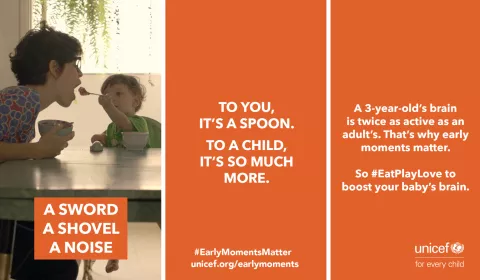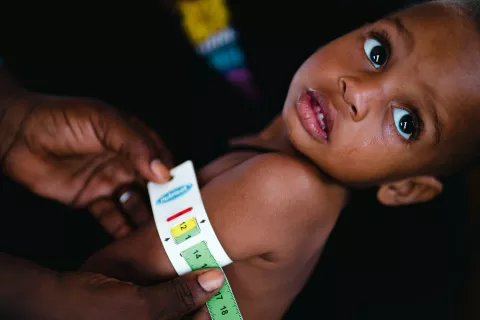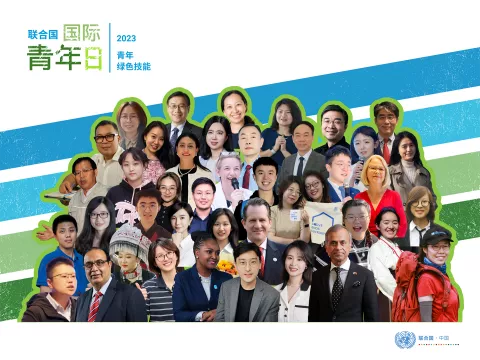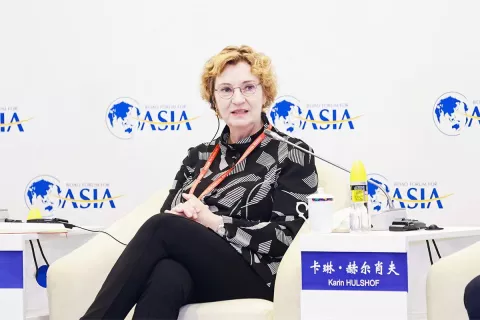Fuelling children's brains to power them for the future
National Consultation on ‘Building Cognitive Capital for Children’ for Sustainable Development
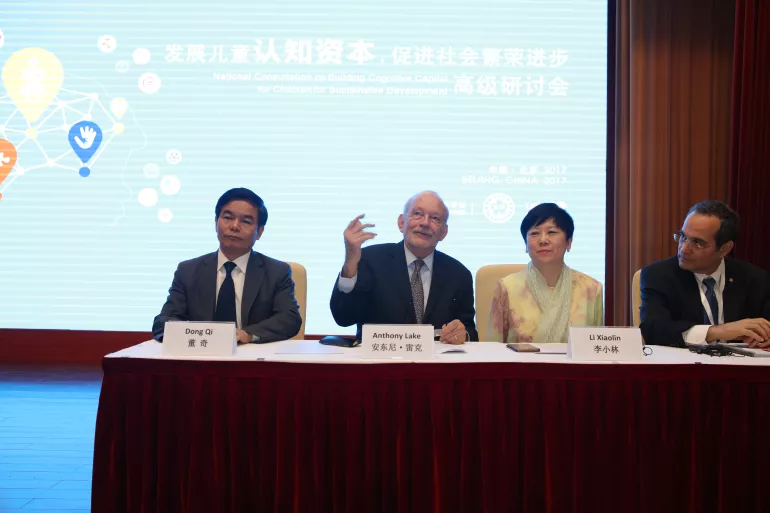
- Available in:
- 中文
- English
Beijing, 16 May 2017 – Investing in high-quality interventions that promote optimal brain development during a child's earliest years of life not only benefits the individual child, but can bring enormous dividends to the future growth and prosperity of China.
The National Consultation on 'Building Cognitive Capital for Children' for Sustainable Development, hosted by the United Nations Children's Fund (UNICEF) and the Chinese People's Association for Friendship with Foreign Countries (CPAFFC), will bring together national and international representatives from government, academic institutions and foundations. The Executive Director of UNICEF Mr. Anthony Lake, and the President of CPAFFC Madam Li Xiaolin, will open the consultation. The meeting will discuss how social and financial investments that raise cognitive capital - the capacity of people to think and learn and work together - will help sustain and grow the economies of the future.
The first 1,000 days of life have a profound effect on a child's future – on her health, education, wellbeing and future success as an adult. When raised with love, nourished and cared for in safe and stimulating environments, children develop the cognitive, emotional and behavioural skills they need to embrace opportunity and bounce back from adversity. They start life with a fair chance to grow, thrive and contribute to their communities and the world.
“An investment in the early crucial years of life is an investment in dignity, in raising the opportunities and potential of every child in China. It is an investment in their developing brain and secures them greater success in education and in their careers”, UNICEF Representative to China Rana Flowers said.
She went on to say: “The economic, neuroscience, and development evidence continues to mount as to why the early years count so much. High quality interventions in childhood by Government is a social obligation and also has a dramatic impact on the future economic growth of nations. With achievement of the sustainable development goals and with China's commitment to eradicate poverty there is no more important use of public finances than investing in children.”
“Through the success of this important consultation, CPAFFC and UNICEF have deepened our mutual trust and partnership. There is nothing more important than the next generation and ensuring that every child has a fair start in life. Every women and every child has an important role to play in China's future,” the President of CPAFFC Madam Li Xiaolin said.
In the face of a changing workforce in Asia, including China, from unskilled and semi-skilled workers to skilled professional employment there has never been a better time to invest in interventions that realize the rights and maximize the brain development of children and prepare them to make the best of the challenges they will one day face in business, digital and technology oriented opportunities. Doing so is not only a win for children, but for business concerns, and in order to sustain the economic gains of previous decades in China.
Interventions in childhood have high rates of social, economic and environmental returns. High quality early childhood education programmes for disadvantaged children can yield a 7 to 10 per cent rate of return on investment in human capital. Investment returns include children's increased school and career achievements as well as reduced costs for remedial education, health and justice system expenditures, with further research needed on the longer term impacts of children's educational environments and cognitive development in adolescence.
On the health front, for every US dollar invested in reducing malnutrition and promoting immunization, the returns are approximately US$45 and US$60 respectively. Investing in breastfeeding may increase world gross national income by at least 0.49 per cent or US$302 billion per year, lead to improvements in IQ, and will not leave an environmental footprint, in contrast to formula feeding.
Violence, abuse and neglect also leaves its imprint, not only on children but on a country's social and economic development. One study has shown that violence against children in China can lead to health consequences and productivity losses that may cost the country upwards of US$101 billion, equal to 1.7 per cent of GDP.
The National Consultation on Building Cognitive Capital for Children will draw attention to progress in global and China' s early childhood development programmes, discuss the evidence from neuroscience and share effective interventions and poverty reduction experiences for children.
Investments made now in good quality programmes that nurture children during their earliest years of life are not only a moral imperative, but will make a significant contribution to China's future and prosperity.
Note to the editor: To read latest research paper, please visit: http://onlinelibrary.wiley.com/doi/10.1002/pchj.170/full
Media contacts
About UNICEF
UNICEF works in some of the world's toughest places, to reach the world's most disadvantaged children. Across 190 countries and territories, we work for every child, everywhere, to build a better world for everyone.
| Visit UNICEF Global website: www.unicef.org Visit UNICEF China website: www.unicef.cn Follow us on Sina Weibo: http://weibo.com/unicefchina Tencent Weibo: http://t.qq.com/unicef Wechat: unicefchina |


